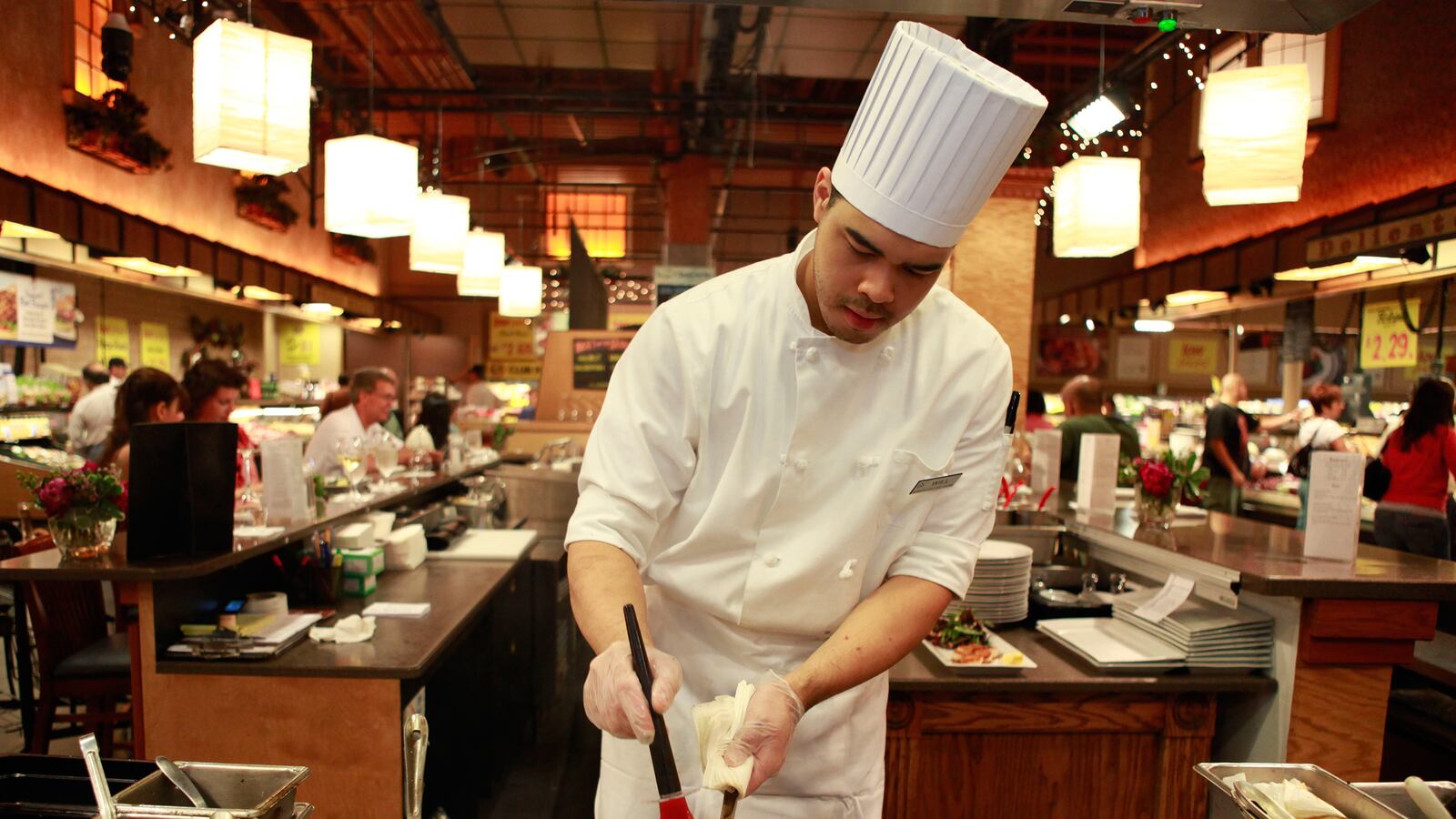When Hillary Clinton said she was moving her campaign headquarters to Brooklyn, there were yawns at her transparent efforts to appeal hip and youthful.
When Wegmans announced this week it would open one of its beloved supermarket stores at the Brooklyn Navy Yard in 2017, ecstatic, joyous pandemonium rippled across the social media universe in small but passionate, crashing waves.
“Brooklyn’s getting a Wegmans. This is the happiest day in my life,” tweeted F’D in Park Slope. “Eff it, moving back to NYC,” Alex Suskind, a journalist who recently moved from Brooklyn to San Francisco, posted on his Facebook wall.
Like the Moonies, Branch Davidians, and Crossfitters, the cult of Wegmans was eager to heap praises upon the supermarket’s impending arrival.
That’s the thing—this evangelical following is for a damn supermarket chain based in upstate New York, a region best known for creating Buffalo wings and claiming NBA star Carmelo Anthony as a resident for one year.
The social media lovefest raises the question: How did Wegmans earn its cult following?
It’s not as if Wegmans is the only beloved, regional grocery chain. Children who grew up with the Stew Leonard’s chain in New York and Connecticut fondly remember the market’s petting zoo, robotic aisle displays, and soft-serve frozen yogurt. Wawa convenience stores may be the one thing New Jersey natives hold in higher esteem than Bruce Springsteen.
But the evangelical Wegmans’ following does stand apart from the typical nostalgia.
One could certainly ask New Jersey Governor Chris Christie what’s so special about Wegmans. He dropped $76,373 at Wegmans with taxpayers’ money.
However, based on the affection for the supermarket chain, I am not sure his constituents would be all that upset.
As far as national chains go, Wegmans is one of the corporations you don’t have to feel guilty supporting.
The nearly-century-old Wegmans is still family-owned, offers scholarships to its employees, and pays its workers extremely well compared to another similarly huge all-in-one supermarket chain, Walmart.
But New Yorkers’ reaction is surprising because it’s not as if we lack our choice of supermarkets: Trader Joe’s, Fairways, Whole Foods, and countless others populate the city.
Wegmans stores, though, are massive and can give you everything you’d want from each of your favorite supermarkets, the brand’s devotees cry.
“It was all the best grocery stores in one place. It was a little Costco, a little Safeway, a little Whole Foods all in one place,” said Suskind. He didn’t grow up with a Wegmans, but discovered the chain when he went to college at Syracuse University.
The new one in Brooklyn will be 74,000 square feet—and that is Wegmans’ smallest outpost.

“It was kind of this destination spot,” said Suskind. “Junior and senior year, I want to say I went there once a week, but I probably went two or three sometimes. We’d be up past two a.m. and drunk, and we’d cab it over there.”
What was so special about Wegmans that kids in a college town, which offers its fair share of drunk food, would shell out for a cab?
“They had these mini pies for one person, and it wasn’t just a slice. It was a circular pie you could pretty much fit in the palm of your hand,” Suskind recalled. He might as well have been William Carlos Williams pondering plums.
“It wasn’t like a diner,” he explained. “But the only people you’d typically see there at three a.m. are drunk college students—or whatever weirdos would be out at 3 a.m. in central New York on a Wednesday.”
While the 86 current Wegmans locations span six states, the chain has a special connection with those who grew up in upstate New York.
“It’s a 24 hour oasis of happiness in a sea of economic downturn,” Katharine Materese said over email of the Wegmans she grew up with in Johnson City, New York. (Materese, who currently lives in Naples, Italy, is also married to this writer’s cousin.)
Upstate New York is one of the most economically depressed parts of the state. To add insult to injury, you’d probably need a stockpile of Valium and whiskey to get through its long and brutal winters. There simply isn’t a ton of social or economic activity in most of the area. Wegmans appears to have filled both of these voids.
“We used to go there late night in high school when there was nothing else to do,” said Materese. “The whole going to Wegmans to cheer up is a real thing. My grandfather went after my grandmother died just for the company and atmosphere.”
Materese still turned to Wegmans to surprise her mom for Mother’s Day last year, even when she was a continent away from Johnson City.
“They have a fabulous bakery. I ordered a cake there for Mother’s Day last year, and they personalized it,” she said. “Then [the workers] chatted my mom up about what we were doing in Italy when dad brought her there to get it.”
In a testament to Wegmans’ range of consumer offerings and its emotional hold, Materese also said that the chain served as the florist for her wedding.
Wegmans was an appropriate choice for her wedding because she remembers the supermarket visits as part of her childhood. “When I was little I was always fascinated by the bulk section,” she said, noting that she loved “weighing out little baggies of candy and nuts.”
That was hardly the only Wegmans culinary delight she praised.
“Am I overwhelming you yet?,” she asked me in the middle of our conversation. “I haven’t even mentioned the prepared food section! Delicious Chinese food available all day long!”
Clearly, the cult-like devotion to Wegmans is more than just the food. The emotional tie was repeated time and again when I interviewed people for this article.
Noah Hoch grew up in Canandaigua, New York, where the Wegmans was also a go-to for the local teens. He remembered how the 24-7 Wegmans was “convenient for bored high school kids who wanted somewhere to go in their boring upstate New York rural town at one a.m. on a summer night.”
Wegmans “felt local and warm,” he told me over email. “I always go to Wegmans when I’m home because it’s part of home.”
I found this description surprising, since Wegmans are notoriously huge. They even have a restaurant-cafe section for dining in the actual store. Why does the McMansion of supermarkets evoke nostalgia?
“I was raised by my single working mom, and Wegmans always made shopping really easy,” Hoch, now a tutor in Watertown, Massachusetts, said. “They group together ingredients for easy to make meals, so that you can shop and cook for your kids and not feel totally exhausted by it.”
While Hoch said he especially loved the store’s “obscure groceries (so many cheeses!)” and the “pre-made quality dinners” (he used to get stuffed pork chops), it was never just one thing at Wegmans.
“It was everything, and it was quality,” he said—as perhaps Brooklynites and New Yorkers will discover for themselves come 2017.






